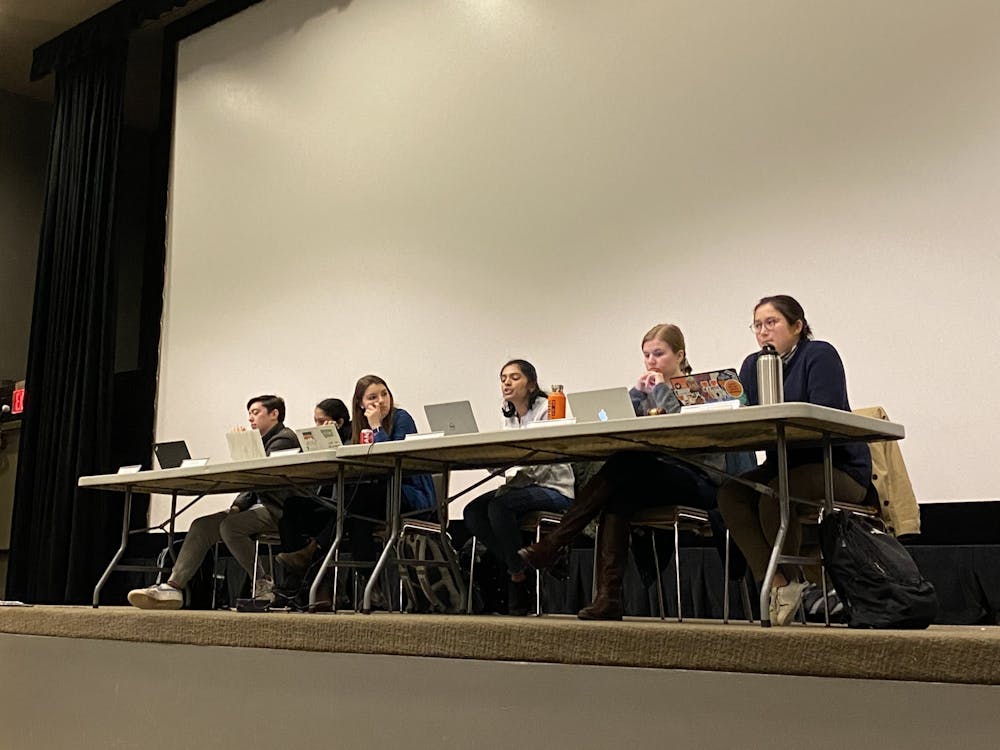At its general body meeting Tuesday night, Student Council voted to table a resolution in support of mental wellness and resiliency Engagement courses, as well as a bill to amend the bylaws in regards to electing the chair of the representative body. The proposed resolution and bylaw will be voted on during the next general body meeting, Feb. 11.
The resolution advocates for the inclusion of a formal mental wellness Engagement course within the New College Curriculum. University faculty voted and approved the New College Curriculum as the official curriculum track for all incoming College students in October 2019.
Currently, there are four types of Engagement classes within the curriculum — Engaging Aesthetics, Empirical Engagement, Ethical Engagement and Engaging Differences. Each Engagement lasts half of a semester, with students taking four Engagements total by the end of their first year. This resolution is in support of replacing the Empirical Engagement with an Engagement category that focuses on mental wellness.
Ryan Alcorn, a second-year College student and co-sponsor of the resolution, expressed his opinions on the importance of this resolution in front of the council.
“Student mental well-being is declining to the point of crisis,” Alcorn said. “Our mental health resources have become desperately overburdened and often do not have the capacity to give students help when they need it most, nor do we have preventative courses to give students a toolkit to deal with the challenges and complexities of college life.”
Mental wellness classes do currently exist at the University, such as LPPL 2100, “The Resilient Student.” However, Alcorn stressed the importance of increasing the amount of courses being offered that promote the health of the individual and University community.
“This is a low-cost way to teach students skills ranging from resilience to bystander intervention,” Alcorn said. “If our administration intends to uphold its mission to, quote, ‘promote students’ physical, mental and emotional well-being’ — and I believe it does — it should consider implementing a mental wellness engagement into the New College Curriculum.”
Second-year College student Noah Strike also supports adding a mental wellness course requirement to the New College Curriculum but does not believe that it should replace the Empirical Engagement requirement. The Empirical Engagement course encourages students to analyze facts, evaluate evidence and ask scientific questions of the natural and social world.
“I do support adding courses about mental health and resilience to the curriculum,” Strike said. “However, I know that a lot of faculty members, especially in STEM fields, feel very strongly about the Empirical Engagement requirements… that would also take away the opportunity for students to study STEM courses outside of the area requirements.”
As a resolution, it would not change any actual rules, but would simply serve as a recommendation to the University to include a mental wellness course in the New College Curriculum. The resolution will be considered again in next week’s Student Council meeting.
Ellie Brasacchio, fourth-year College student and Student Council president, introduced a bylaw that would require representatives to be present for all of the candidate speeches for the Student Council Chair of the Representative Body elections in order to vote in the election. The new Chair of the Representative Body is elected by Student Council’s representatives and acts as a liaison between the representatives and other officers.
“Every year it’s a debacle trying to figure out whether or not people can vote remotely, whether or not they can put in their vote before candidates give speeches,” Brasacchio said. “I don't think it's fair to the candidates who are running to allow people who haven't been present for all the candidates’ speeches to vote.”
Following Brasacchio’s statements, Ally Kammerman, Student Council representative and fourth-year College student, expressed that forcing members to be present to be able to vote would be unfair to those with conflicting commitments.
“Everyone here is involved in a million organizations, so you're never going to be able to find a time that fits everyone's schedule,” Kammerman said. “It's unfair to ask them to put something else aside just for this extra day.”
Kammerman suggested scheduling elections further in advance to allow people to plan better, as well as looking into submitting votes electronically.
Brasacchio was not expecting pushback on the bill but stands by her sentiment that giving more structure to the Student Council voting system would be more fair.







